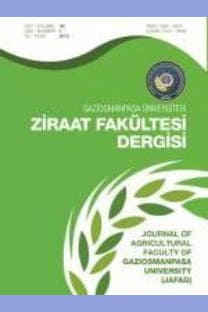Towards Food Safety: Hand Washing and Environmental Hygiene Practices of Farming Households in North-Central Nigeria
Towards Food Safety: Hand Washing and Environmental Hygiene Practices of Farming Households in North-Central Nigeria
___
- Aarnisalo, K., Tallavaara, K., Wirtanen, G., Maijala, R. and Raaska, L. (2006). The hygienic working practices of maintenance personnel and equipment hygiene in the Finnish food industry. Journal of Food Control 17: 1001-1011.
- Abd Patah, M. O. R., Issa. Z. M. and Nor, K. M. (2009). Food safety Attitude of Culinary Arts Based Students in Public and Private Higher Learning Institutions (IPT). International Education Studies 2(4): 168 - 178.
- Adejero, L. (2013). Proper Food Safety Practices and Hand Washing Prevent Food Borne Diseases. Daily Times of 3rd December, 2013. Retrieved on 3rd March, 2014 from www.dailytimes.com.ng
- Bizatu, M. and Negga, B. (2010). Community based assessment on household management of waste and hygiene practices in Kersa Woreda Eastern Ethiopia. Ethiopia Journal of Health Development. 24(2):103 -109.
- Cairncross, S. Hunt, C. Boisson, S. Bostoen, K. Curtis, V. Fung, I. and Schmidt, W.P. (2010) Water, sanitation and hygiene for the prevention of diarrhoea. International Journal of Epidemiology. 39(1): 193- 205.
- Center for Science in the Public Interest (CSPI) (2005). Global and Local Food Safety Around the World. Pp 4-28 Retrieved June 10, 2014, from www.safefoodinternational.org
- Food Security Analysis Unit (FSAU) (2007). Knowledge, Attitude and Practice Study (KAPS): Infant and young child feeding and health seeking practices of Somalia (Report).Retrieved on 25th/8/2014 from http:www.fsausomali.org: 5- 45
- Gbadegesin, N. and Olorunfemi, F. (2007). Assessment of Rural Water Supply Management in Selected Rural Areas of Oyo State, Nigeria. ATPS Working Paper Series 49: 1 - 64. A publication of African
- Technology Policy Studies Network (ATPS), P.O. Box 10081, 00100 General Post office, Nairobi, Kenya.
- Gul, R. (2012). Hand washing practices of food handlers in the hospitality establishments of Peshawar city. Journal of Medical Science (Peshawar, Print), 20(1): 22-25.
- Jens, V., Monika, T., Rainer, L., Ibrahim, B., Sibel, S., Aynur, K., Alexendra, U., Farouk, M. and Herbert, P. (2009). Detection of Adenoviruses and Rotaviruses in Drinking Water Sources Used in Rural Areas of Benin, West Africa. Applied and Environmental Microbiology. 75 (9): 2798-2801.
- Karnali Integrated Rural Development and Research Centre (Mission East/KIRDARC) (2009).
- Knowledge, Attitude and Practices "Clean water, improved sanitation and hygiene promotion in rural villages of Humla and Mugu, Mid-West Nepal" ECHO/NPL/BUD/2008/01005 Final report. Pp 8 - 22.
- Mohammed, S. G. S. (2013). Food Safety Knowledge among Women in Selected Areas in Khartoum City. International Journal of Science and Research (IJSR), India, 2 (2): 519-525.
- Musa, O. I. and Akande, M. T. (2003). Food Hygiene Practices of Food Vendors in Secondary Schools in Ilorin. The Nigerian Postgraduate Journal, 10 (3): 192-196.
- Nee, S.O.I. and Sani, N.A. (2011). Assessment of Knowledge, Attitude and practice (KAP) Among Food Handlers at Residential Colleges and Canteen Regarding Food Safety. Sains Malaysiana 40 (4): 403- 410.
- Phaswana-Mafuya, N. and Shukla, N. (2005). Factors that could motivate people to adopt safe hygienic practices in the Eastern cape Province, South Africa. Africa Health Sciences, 5 (1):21 - 28.
- Rahman, M. M., Taha Arif, M., Bakar, K., and Tambi, Z. (2012): Food Safety Knowledge, Attitude and Hygiene Practices among the Street Food Vendors in Northern Kuching City, Sarawak . Borneo Science. 31: 95 - 103.
- Sudershan. R.V., Rao, P. and Polasa, K (2009). Food Safety Research in India: a review. Asian Journal of Food and Agro-Industry 2(03): 412-433.
- Tyabo, I. S., Ibrahim, M., Ndanista, M. A. and Umar, I. S. (2014). Assessment of participation of Rural Women in Farming Activities in Shiroro Community of Niger State, Nigeria. International Journal of Physical and Social Sciences 4(4): 573-586.
- UNICEF/WHO (2008), A Snapshot of Drinking Water and Sanitation in Africa: A regional perspective based on new data from the WHO/UNICEF Joint Monitoring Programme for Water Supply and Sanitation retrieved 23rd/12/2014 from www.wssinfo.org.
- UNICEF (2008). Global Hand Washing Day - Planners guide. Retrieved on 8th/10/2015 from www. unicef.org
- UNICEF (2010). Water, Sanitation and Hygiene. Retrieved from: http://www.unicef.org/wes/ index.html. on 23rd/12/2014.
- United Nations Educational, Scientific and Cultural Organization - World Water Assessment Programme (UNESCO-WWAP) (2003). Water for People, Water for Life: The United Nations World Water
- Development Report. UNESCO and Berghahn Books, Barcelona,Spain.
- Warnock, F (2007). Community Based Intervention Study of Food Safety Practices in Rural Community
- Households of Cambodia. Final Report Submitted to World Health Organization Regional Office for the Western Pacific. Pp15.
- ISSN: 1300-2910
- Yayın Aralığı: Yılda 3 Sayı
- Başlangıç: 1985
- Yayıncı: Tokat Gaziosmanpaşa Üniversitesi Ziraat Fakültesi Dergisi Yayın Ofisi
Fatma KOYUNCU, Seda SEVİNÇ ÜZÜMCÜ
Farklı Toprak İşleme Yöntemlerinin Erozyon Yönünden Karşılaştırılması
MUSTAFA KAN, Murat KÜÇÜKÇONGAR, Alexey MORGOUNOV, Mesut KESER, Fatih ÖZDEMİR, Hafız MUMINJANOV, Calvin O QUALSET
Koruyucu Yapı Tipinin Traktör Gürültü ve Titreşim Karakteristikleri Üzerine Etkisinin Belirlenmesi
Ahmet Şeyhim AKYÜZ, METİN GÜNER
Seda SEVİNÇ ÜZÜMCÜ, Fatma KOYUNCU
Katı Kültür Fermantasyon Tekniği ile Streptomyces sp. TEM25'ten Ksilanaz Üretimi
BİLGE HİLAL ÇADIRCI, İHSAN YAŞA
Chris CAVALARIS, BAHATTİN AKDEMİR, Chris KARAMOUTIS, Theofanis GEMTOS
Erzincan İlinde Üretilen Balların Biyokimyasal Özellikleri
SEVİL KARAHAN YILMAZ, GÜNAY ESKİCİ
Bazı Kırmızıbiber Hatlarının Patates Y Virüs (Potato Virus Y, Pvy) Patotiplerine Reaksiyonları
Kerim KARATAŞ, BEKİR BÜLENT ARPACI, NİHAL BUZKAN, Ayşe Gül TEKİK
